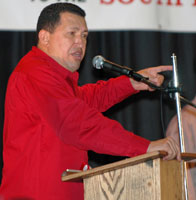Venezuela sells oil to poor at discount
By
Evan Sarmiento
and
Bryan G. Pfeifer
Boston
Published Dec 1, 2005 1:26 AM
In a
resounding gesture of humanitarian internationalism, CITGO, a wholly owned
subsidiary of the Venezuelan state oil company PDVSA, began shipping 12 million
gallons of discounted home-heating oil for 45,000 low-income families and local
social-service organizations in Massachusetts during the week of Nov. 27.
|
Venezuela President Hugo Chávez
|
A similar program is underway in the Bronx, N.Y., and preliminary
discussions regarding possible CITGO heating oil subsidies are taking place in
Maine and other parts of the U.S. where blistering cold weather is a
factor.
Due to Big Oil’s price gouging and restriction on
production, home heating oil costs are expected to increase 30 to 50 percent
this winter. Venezuela’s offer will help thousands of working class and
oppressed people who would have been unable to adequately heat their dwellings
and thus risk dying from the cold.
The Massachusetts contract signing
took place at a news conference Nov. 22 at the home of Linda Kelly and Paul
Kelly in Quincy, Mass. The couple has three children, one with diabetes. Linda
Kelly has multiple sclerosis. The Kelly family became eligible for the PDVSA oil
subsidies because their state fuel assistance ran out last winter.
“He’s doing the right thing,” said Linda Kelly of
Venezuelan President Hugo Chávez, who arranged the subsidies.
Chávez first pledged this life-saving assistance in a meeting with the
Rev. Jesse Jackson in Caracas in August. “There were people who were going
to freeze to death…. This is huge,” said Kelly.
The discounted
heating oil will be available to Massachusetts households receiving federal fuel
assistance who have used up their $550 annual federal subsidy. Families would
pay about $276 for a 200-gallon shipment, a savings of about $184. The shipment
will last about three weeks.
CITGO will deliver the oil, and Citizens
Energy, a non-profit organization providing subsidized oil to Massachusetts
residents, will distribute it. Then about 350 local dealers will deliver
approximately 75 percent of the oil to local families. Mass EnergyConsumer
Alliance will distribute or sell the remaining quarter to homeless shelters,
food banks and low-income groups.
Venezuela has arranged for 285,000
barrels to be shipped to Massachusetts within the next few weeks at a 40 percent
discount.
“This program represents the fulfillment of the promise
made to people in the United States by our President, Hugo Chávez,”
said Venezuelan envoy Bernardo Alvarez Herrera at the Quincy news conference.
“We are committed to working for a hemisphere with less poverty and more
development, whether by teaching 1.5 million adults to read in Venezuela or
helping Massachusetts residents through a long winter.”
All the
major U.S. oil corporations were asked to participate in similar agreements;
they all refused despite record-breaking profits in 2005 arising from their
decision to reduce production during and after Hurricanes Katrina and Wilma.
This decision drove up prices.
The companies have also benefited from
billions in federal subsidies. Most of Big Oil’s losses incurred when
refineries, pipelines and other infrastructure were destroyed in the hurricanes
are expected to be recovered through insurance as well.
According to
Standard & Poor’s, ExxonMobil, the world’s largest publicly
traded oil corporation, just had its highest-ever quarterly profit, $9.92
billion, up 75 percent from its 2004 third quarter. ExxonMobil also set an indus
try record of $100.72 billion in sales. BP-Amoco, Chevron, ConocoPhillips,
Marathon and Royal Dutch/Shell also had record profits.
In contrast,
President Chávez has vowed to set aside 10 percent of all the oil that
CITGO refineries produce for his own country’s oil-for-the-poor program.
Thus far, Venezuela is providing subsidized or discounted oil to more than 20
nations in South America, the Caribbean and beyond.
Big Oil profits as
the poor die
It is testament to the miserable state of affairs in the
United States, where profits are placed before human beings, that poor people
have to turn to an underdeveloped country like Venezuela, still struggling to
industrialize after decades of neocolonialism, to get discounted oil.
Each
year in the United States an average of 689 people die from hypothermia, a
preventable medical emergency caused by prolonged exposure to cold temperatures,
says the federal Centers for Disease Control.
Hypothermia-related deaths
are preventable. A disturbing report from the Southern Medical Journal revealed
that 61.5 percent of such deaths last winter were among African Americans. The
CDC confirmed the Journal’s findings, admitting that insufficient access
to heat kills African Americans and Latin@s at a higher rate than whites.
Bolivar’s dream resurrected
Venezuela’s gesture
of genuine internationalism, which embraces the working class and oppressed of
the U.S., is fundamental to the constitution of the Bolivarian Republic of
Venezuela. This document guarantees economics of solidarity and mutual aid,
rather than the free trade and neoliberalism that are used to ransack
underdeveloped nations, steal their natural resources and put profits in
command, resulting in whole countries mired in poverty.
Mutual assistance
is part of Venezuela’s foreign policy. Venezuela has championed the
Bolivarian Alternative for the Amer icas (ALBA in its Spanish initials) as
opposed to the U.S.-sponsored Free Trade Area of the Americas (FTAA).
Chávez’s internationalist use of oil wealth threatens the very
essence of neocolonialism in South Amer ica as ALBA embraces integration, deve
lopment and hemispheric unity as opposed to wholesale imperialist plundering.
The U.S. government and Big Oil are, of course, worried about these
developments. They claim that Chávez uses “oil as a weapon”
to undermine U.S. foreign policy. Venezuela is not using oil as a weapon, but is
using it within the context of South American integration and “21st
century socialism,” attempting to encourage U.S client states to shake off
the influence of imperialism.
Articles copyright 1995-2012 Workers World.
Verbatim copying and distribution of this entire article is permitted in any medium without royalty provided this notice is preserved.
Workers World, 55 W. 17 St., NY, NY 10011
Email:
ww@workers.org
Subscribe
wwnews-subscribe@workersworld.net
Support independent news
DONATE


